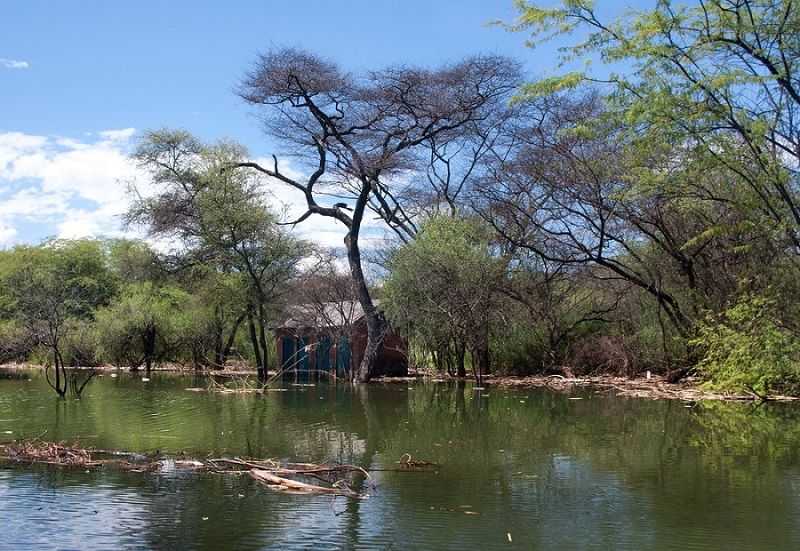Home>Learning by Doing: Human Rights and Climate Change in Kenya with the HEDG law clinic programme

10.09.2025
Learning by Doing: Human Rights and Climate Change in Kenya with the HEDG law clinic programme
Emma Gilmore, Wiktoria Grzech and Ricardo Veraza Gonzalez, students from Paris School of International Affairs (PSIA), were enrolled on the Human Rights, Economic development and Globalization (HEDG) clinic programme in 2024-2025. Under the supervision of project tutors Tatiana Perez and Oscar Eschenbrenner, they’ve worked on the clinic project “The impact of global warming on the right to health in Kenya” with the non-governmental organization Human Dignity.
As part of their clinic project with Human Dignity, and with the Centre for Enhancing Democracy and Good Governance, the students submitted a joint report to the UN Committee on Economic, Social and Cultural Rights regarding Kenya's compliance with the International Covenant on Economic, Social and Cultural Rights.
The report analyses the Kenyan government's response to the impact of climate change on women's right to health around Lake Baringo in the Rift Valley Province in the west-central region of Kenya.
Here, they share their clinic experience with us.

Why did you choose to apply for the HEDG clinic programme?
Emma: I chose to apply for the HEDG clinic programme as I saw it as a great opportunity to gain some professional experience in human rights reporting and advocacy and to home in on the skills I was using in my project work by attending specialized clinic classes.
Wiktoria: I studied economics for my undergraduate degree, and I did an experiential one-year study abroad programme on 4 continents in human rights and public health. I am currently studying international development. The clinic, and specifically my project, cover those themes and I was keen to continue working on this and gain further practical experience.
Tell us about your clinic project?
We are partnering with Human Dignity, which advocates for Economic, Social and Cultural Rights on the African continent. Our project consists of documenting how climate change affects the right to health of women around Lake Baringo. We have submitted a report to the Committee on Economic, Social and Cultural Rights and organized a webinar on the use of strategic litigation and campaigning to address the impacts of climate change on women's rights, taking into account the differences between actions in a local, national and international context as well as the challenges associated with working on climate change and women's rights nexus.
What are your professional plans?
Wiktoria: I envision my future at the intersection of development economics, gender, and health policy as a policy analyst.
Ricardo: After having this experience with the Law school Clinic, I reaffirm my desire to engage in human rights documentation as a professional path. I think that researching human rights violations to launch advocacy campaigns is what I am most passionate about.
What advice would you give to a student interested in the Law Clinic?
Emma: I would advise students to carefully read over the different project proposals and choose the one which speaks to their interests and skills, so as to maximise their Clinic experience.
Ricardo: I would advise students to understand that a Clinic project is a very big but exciting responsibility. In it, you and your teammates will take on a big responsibility and you will have to manage a large part of the project. If you are ready for an intense learning experience and a big challenge, I encourage you to take part!
Tatiana Perez and Oscar Eschenbrenner talk to us about their role as project tutors.
WHAT IS YOUR ACADEMIC AND PROFESSIONAL BACKGROUND?
Oscar: I graduated from the dual Master’s degree between Sciences Po PSIA (Human Rights and Humanitarian Action) and King’s College London (Conflict, Security and Development) in 2024. I am now working in the field of conflict resolution.
Tatiana: I will be graduating from PSIA this summer (Master in International Development). I am working in the area of tax and development, with prior experience in academic research and public interest law.
WHAT IS YOUR ROLE AS TUTORS?
As tutors, we support communication and coordination between the students, the partner organization, and the Sciences Po Law school Clinic. We help students find the direction for their project, check in with them on their progress, guide them in their research, and remain available to answer their questions. It has been a fascinating experience to learn more about the work of Human Dignity, follow the research of the students, and better understand the consequences of climate change on the right to health in Kenya.
FIND OUT MORE
- Discover the activities of the Law school clinic
- Find out more about the Human rights, economic development and globalization (HEDG) clinic programme
Cover image caption: Flooded house at Lake Baringo, Kenya (credits: Belikova Oksana / Shutterstock)